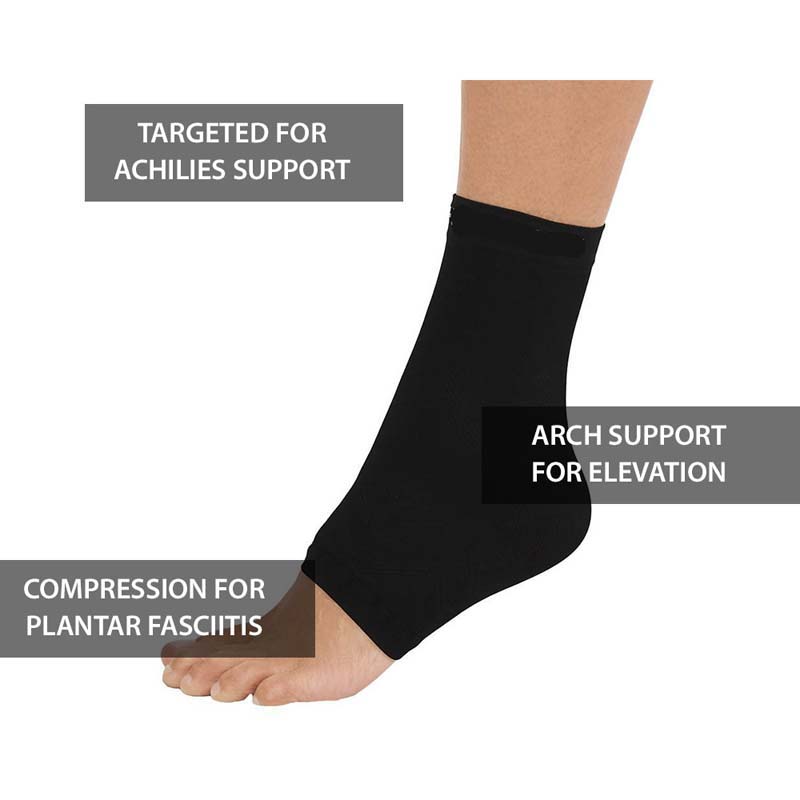The Psychological Aspect of Living with Plantar Fasciitis

Featured Products for Plantar Fasciitis Foot Pain Relief
Living with plantar fasciitis goes beyond the physical symptoms of heel pain; it often involves navigating the psychological impact that chronic pain and discomfort can have on ones well-being. In this blog post, well delve into the psychological aspects of coping with plantar fasciitis, exploring the emotional challenges individuals may face and offering strategies to maintain a positive mindset while managing the condition.
Understanding the Emotional Impact:
-
Chronic Pain and Frustration:
- Dealing with persistent pain from plantar fasciitis can lead to frustration and irritability. The constant discomfort may affect ones mood and overall sense of well-being.
-
Limitation of Activities:
- The limitations imposed by plantar fasciitis on daily activities and exercise routines can contribute to feelings of helplessness and a sense of loss. Individuals may grapple with the inability to engage in activities they once enjoyed.
-
Disruption of Daily Life:
- The pain and discomfort associated with plantar fasciitis can disrupt daily life, affecting work, social interactions, and even sleep. Coping with these disruptions may lead to stress and anxiety.
-
Impact on Mental Health:
- Living with a chronic condition like plantar fasciitis can impact mental health. Anxiety, depression, and feelings of isolation may arise, particularly if the condition persists despite various treatment efforts.
Strategies for Coping with the Psychological Impact:
-
Acceptance and Mindfulness:
- Practice acceptance of the current situation and embrace mindfulness techniques. Mindfulness can help individuals stay present, focus on positive aspects of life, and reduce stress associated with the uncertainty of managing plantar fasciitis.
-
Setting Realistic Expectations:
- Establish realistic expectations for the recovery process. Acknowledge that healing may take time, and setting achievable milestones can foster a sense of accomplishment.
-
Seeking Support:
- Share your experience with friends, family, or a support group. Having a support system can provide emotional reassurance, understanding, and practical assistance when needed.
-
Professional Guidance:
- Consult with healthcare professionals, including psychologists or counselors, to address the emotional impact of living with plantar fasciitis. Professional guidance can offer coping strategies and support tailored to your individual needs.
-
Maintaining Social Connections:
- Stay socially connected, even if certain activities need modification. Engage in social activities that align with your comfort level and physical abilities to prevent feelings of isolation.
-
Adapting Activities:
- Explore adaptive ways to continue participating in activities you enjoy. Modifying your approach or discovering new interests can contribute to a sense of fulfillment and accomplishment.
-
Focus on What You Can Control:
- Concentrate on aspects of your life that you can control. This might include adhering to a treatment plan, practicing self-care, or cultivating a positive mindset despite the challenges.
-
Incorporating Relaxation Techniques:
- Integrate relaxation techniques, such as deep breathing or progressive muscle relaxation, into your daily routine. These practices can help manage stress and contribute to overall emotional well-being.
-
Celebrating Small Achievements:
- Celebrate small achievements in your journey with plantar fasciitis. Recognize and reward yourself for progress, whether its successfully completing a gentle exercise routine or experiencing a reduction in pain.
-
Visualization and Positive Affirmations:
- Use visualization techniques to picture positive outcomes and employ positive affirmations to foster a constructive mindset. Cultivating optimism can have a beneficial impact on mental well-being.
Addressing Anxiety about the Future:
-
Communication with Healthcare Providers:
- Maintain open communication with your healthcare providers about your concerns and anxieties regarding the future. Understanding the potential trajectory of your condition and having a clear plan can alleviate uncertainty.
-
Exploring Treatment Options:
- Explore various treatment options and discuss potential interventions with your healthcare team. Being proactive in seeking solutions can empower you and reduce anxiety about the future.
-
Creating a Wellness Plan:
- Work with healthcare professionals to create a comprehensive wellness plan that addresses both the physical and psychological aspects of living with plantar fasciitis. A holistic approach can contribute to a more balanced and positive outlook.
Conclusion:
Navigating the psychological aspects of living with plantar fasciitis requires resilience, self-compassion, and a multifaceted approach to well-being. By acknowledging and addressing the emotional impact of the condition, individuals can develop effective coping strategies, maintain a positive mindset, and work towards a more fulfilling and resilient life despite the challenges posed by plantar fasciitis. If you find yourself struggling with the psychological aspects of the condition, dont hesitate to seek professional support to guide you on your journey to well-being.
Featured Products for Plantar Fasciitis Foot Pain Relief
Latest Blogs
- Taking a Stand Against Heel Pain: Practical Solutions
- Happy Heels, Happy Life: Banishing Foot Pain for Good
- The Road to Relief: Strategies for Combating Heel Pain
- Heel to Toe Wellness: Tackling Foot Pain Head-On
- Foot Pain Decoded: Understanding the Signals Your Feet Send
- Soothing Steps: Natural Remedies for Heel and Foot Pain
- Putting Your Best Foot Forward: Managing Heel Discomfort
- The ABCs of Happy Feet: Beating Heel and Foot Pain
- From Heel to Toe: Navigating Common Foot Pain Issues
- Taking a Step Back: Causes and Remedies for Heel Pain
- Footloose and Pain-Free: Tips for Happy Heels and Feet
- Soleful Solutions: A Guide to Alleviating Heel and Foot Discomfort
- Stepping Into Comfort: Understanding Heel and Foot Pain
- From Pain to Progress: Inspiring Plantar Fasciitis Journeys
- Living a Full Life with Plantar Fasciitis: Success Stories
- Plantar Fasciitis and Exercise: Finding the Right Balance
- The Impact of Stress on Plantar Fasciitis Symptoms
- Plantar Fasciitis: When to Seek Professional Help
- Inflammatory Foods and Plantar Fasciitis: What to Avoid
- Ergonomics and Plantar Fasciitis: A Comprehensive Guide
- The Importance of Rest in Plantar Fasciitis Recovery
- Traveling with Plantar Fasciitis: Tips for Happy Feet
- Plantar Fasciitis and Your Sleep: Improving Rest Quality
- The Psychological Aspect of Living with Plantar Fasciitis
- Plantar Fasciitis and High-Impact Activities: Navigating Risks
- How to Stay Active with Plantar Fasciitis: Practical Tips
- Plantar Fasciitis and Aging: Strategies for Seniors
- Cryotherapy for Plantar Fasciitis: Icy Relief for Your Feet
- Aquatic Exercise for Plantar Fasciitis: Dive into Healing
- Mindfulness and Meditation for Plantar Fasciitis Relief
- Heel Pain 101: A Guide to Plantar Fasciitis
- Finding Relief - Plantar Fasciitis Home Remedies
- The Emotional Toll of Chronic Plantar Fasciitis
- Post-Workout Foot Care for Plantar Fasciitis Sufferers
- DIY Foot Massage Techniques for Plantar Fasciitis
- From Diagnosis to Recoveryc- Navigating Plantar Fasciitis
- Plantar Fasciitis in Children Signs and Solutions
- Plantar Fasciitis and Weight: Impact on Foot Health
- How Nutrition Affects Plantar Fasciitis Recovery
- Yoga for Plantar Fasciitis: Poses for Pain Relief
- Breaking Down Plantar Fasciitis Myths and Misconceptions
- Plantar Fasciitis Stretches - Daily Routine for Relief
- The Link Between Plantar Fasciitis and Flat Feet
- Plantar Fasciitis in Pregnancy - What to Expect
- Desk Job Dilemma - Coping with Plantar Fasciitis at Work
- Plantar Fasciitis in Athletes Strategies for Recovery
- Massage and Plantar Fasciitis A Soothing Combination
- Plantar Fasciitis at Night: Tips for Better Sleep
- Plantar Fasciitis vs Heel Spurs - Understanding the Difference
- The Role of Stretching in Plantar Fasciitis Recovery
- Running with Plantar Fasciitis: Dos and Donts
- Preventing Plantar Fasciitis: Tips for Foot Health
- Natural Remedies for Plantar Fasciitis You Havent Tried
- Heel Pain Demystified: Plantar Fasciitis Explained
- Best Shoes for Plantar Fasciitis: A Comprehensive Guide
- Managing Plantar Fasciitis Pain: Tips and Tricks
- The Complete Guide to Plantar Fasciitis Treatment Options
- 10 Effective Exercises for Plantar Fasciitis Relief at Home
- Understanding Plantar Fasciitis: Causes and Symptoms
- Why do I get Pain in My Feet at Night
- Is pain in your feet a sign of diabetes
- What causes pain in my feet
- Plantar Fasciitis - Why so Painful
- What is that pain in my heel
- Should I Walk with Foot Pain
- How to Treat Ankle Pain
- 10 Best Exercises of Plantar Fasciitis
- Do Compression Socks Help Foot Pain
- Do Insoles Work for Foot Pain
- Best Stretches for Plantar Fasciitis
- 5 Causes of Plantar Fasciitis
- Do Back Posture Braces Actually Work
- Foot pain from walking
- Best Insoles for Plantar Fasciitis
- Pain in heel of foot after Running
- Treatment for Pain in arch of foot
- Pain on top of foot
- Mortons neuroma treatment
- How to remove an Ingrown Toenail
- Foot Heel Spur Pain
- Sore Foot in the Morning
- Suffer Heel Pain in the Morning ?
- Start a running routine
- Running through Fatigue
- Best Achilles Tendonitis and Ankle Excercises
- Causes of Achilles Tendonitis and Ankle Pain
- Plantar Fasciitis Cure and Treatment
- Best Plantar Fasciitis Products
- Causes of Plantar Fasciitis and Heel Spur Pain
- Best Plantar Fasciitis Excercises



















